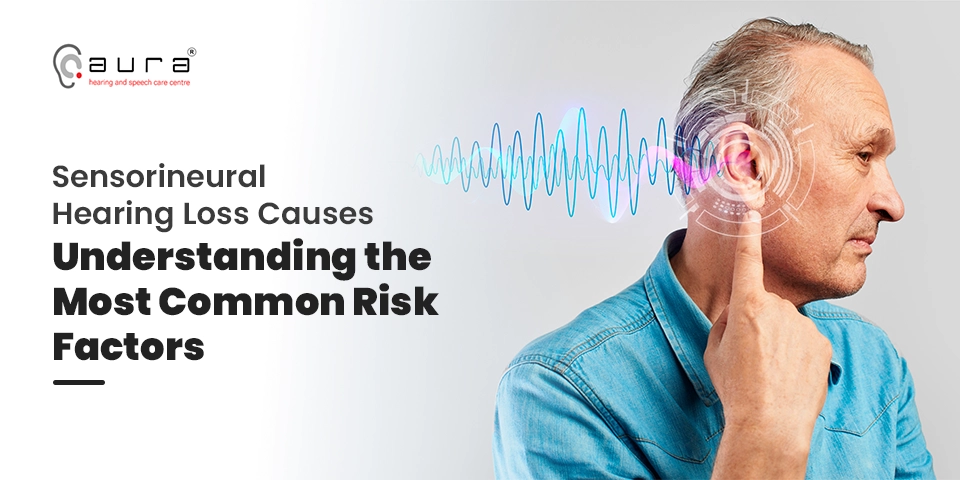
According to the recent report published by the World Health Organization, around 466 million people (or 6.1% of the world’s population) were living with disabling hearing loss in 2018. It is projected to rise to 630 million by 2030 and to over 900 million by 2050. Among the three types of hearing loss — sensorineural, conductive, and mixed—sensorineural hearing loss is one of the most common types of hearing loss observed in people, accounting for over 90% of cases. In this blog, we will explore the causes, symptoms, and treatments of sensorineural hearing loss.
What Is Sensorineural Hearing Loss?
Sensorineural hearing loss is a medical condition caused by damage to the inner ear, particularly the tiny hair cells responsible for converting sound vibrations into electrical signals, or to the auditory nerve that transmits these signals to the brain. This type of hearing loss disturbs the process of sound awareness, leading to difficulties in hearing and understanding speech.
Individuals with sensorineural hearing loss frequently experience sounds as muffled or distorted, mainly struggling to distinguish soft sounds and understand conversations in noisy environments. Unlike conductive hearing loss, which involves difficulties with the outer or middle ear, sensorineural hearing loss occurs within the delicate structures of the inner ear or the neural pathways to the brain.
Causes of Sensorineural Hearing Loss
Sensorineural hearing loss can be caused by several factors, and here are some of the most common ones:
- Aging: Just like other parts of your body, your ears can wear out as you age. This is the most common cause. Elderly people are highly susceptible to sensorineural hearing loss.
- Loud Noises: Prolonged exposure to loud sounds, like at concerts, factories, or construction sites, can damage the tiny hair cells in your inner ear.
- Genetics: Sometimes, hearing loss runs in families. Genetic factors are one of the reasons that may affect the function of the inner ear and auditory nerve.
- Certain Diseases: Some diseases, like measles, mumps, or meningitis, can also damage the function of the ear.
- Certain Medicines: Some medications, especially antibiotics or chemotherapy drugs, can have an ill effect on the hearing of sound as a side effect.
- Head Injuries: A serious injury to the head can damage the inner ear or the auditory nerve, thus leading to the hearing process of the ear.
- Congenital: Sometimes, babies are born with hearing loss because of complications during pregnancy or delivery. This type of hearing loss is also called congenital hearing loss.
Tumors: In rare cases, a tumor on the auditory nerve can cause hearing loss.
Symptoms of the Sensorineural Hearing Loss:
Here are some of the major symptoms of sensorineural hearing loss:
- Distorted Hearing: Instead of clear and crisp sounds, a person may hear sound that lacks clarity, as if heard through a filter.
- Difficulty Understanding Speech, Particularly In Noisy Environments: Background noise significantly impedes comprehension, leading to misunderstanding.
- Trouble Hearing High-Pitched Sounds: Higher frequencies, which are important for understanding certain speech sounds (like “s,” “f,” and “th”), are diminished. A person may also miss high-pitched environmental sounds, such as birdsong or the ringing of a doorbell.
- Tinnitus (ringing in the ears): A continuous ringing, buzzing, hissing, or other internal sound. This also affects sleep and concentration.
- Needing Higher Volume of Audio Devices: Requiring higher volume levels for televisions, radios, and other audio sources.
- Frequent Requests for Repetition: Constantly asking others to repeat themselves due to missed or misunderstood words.
- Challenges in Following Group Conversations: Difficulty keeping up with discussions, especially in social settings.
Treatment of Sensorineural Hearing Loss
There are several treatment options available to manage the sensorineural hearing loss to improve quality of life.
- Hearing Aids:
These devices are used to amplify sound waves, making them louder and easier to hear. An audiologist will help choose the best type and fit for your specific hearing loss. Aura Hearing Care offers a range of advanced hearing aids, including:
Receiver In Canal (RIC): The device is compact and hidden, good for people new to hearing aids.
Completely in the Canal (CIC): It is designed to fit completely inside your ear canal.
Invisible in Canal (IIC): This is a minimal device, almost totally hidden, with just a tiny part to help take it out.
In the Canal (ITC): Fits partly in the ear canal, with a small portion showing.
In the Ear (ITE): This is a personalized hearing aid, designed to fit the outer ear for comfort.
Behind the Ear (BTE): This device is the most used type and is available in different sizes.
- Cochlear Implants:
For very severe sensorineural hearing loss conditions, cochlear implants can send signals directly to the hearing nerve, skipping the damaged parts of your inner ear. These are put in during surgery and turn sound into signals that go to your hearing nerve, which helps you hear and understand speech better.
- Medications:
If you suddenly lose your hearing, doctors might give you some corticosteroids to relieve swelling in your inner ear. However, medication treatment is typically temporary.
- Assistive Listening Devices (ALDs): These devices can make hearing easier in certain environments, like when you’re watching TV or talking on the phone.
- Communication Learning:
Learning effective ways to talk and listen better can help you deal with hearing loss every day.
- Management of Tinnitus:
Because tinnitus often comes with sensorineural hearing loss, dealing with it is important. Management of tinnitus is critical in the treatment of sensorineural hearing loss.
Conclusion:
Sensorineural hearing loss may be permanent, but with the right treatment, this condition is manageable. From advanced hearing aids to cochlear implants and assistive devices, there are many treatment options available to improve hearing and overall quality of life.
Moreover, effective communication strategies and tinnitus management can also contribute to the overall hearing process. If you or a loved one is experiencing hearing loss, consulting an audiologist or ENT specialist is the first step toward finding the best solution.
Are you looking to improve your hearing? Explore advanced hearing aids at Aura Hearing Care or book a consultation today.
1. What is sensorineural hearing loss?
Sensorineural hearing loss (SNHL) is a medical condition in which the inner ear or the hearing nerve is damaged. It is usually permanent, but various treatments are available to manage the condition.
2. How do hearing aids help with sensorineural hearing loss?
Hearing aids increase sound quality, making it easier to hear. Nowadays, there are various modern devices available that come with features like noise reduction and directional microphones for better clarity.
3. When should someone consider cochlear implants?
Cochlear implants are used for severe cases where they bypass damaged parts of the inner ear and send sound signals directly to the auditory nerve. They are placed inside the ear during surgery.
4. Does Aura Hearing Care offer solutions for severe hearing loss?
Absolutely, for individuals with severe hearing loss, Aura offers advanced hearing aids and expert advice on when to use cochlear implants.
5. How can I book a consultation with Aura Hearing Care?
You can book an appointment with Aura’s hearing specialists through the website (Hearing Aids – Aura Hearing Care) or visit a nearby branch for an in-person hearing assessment.







